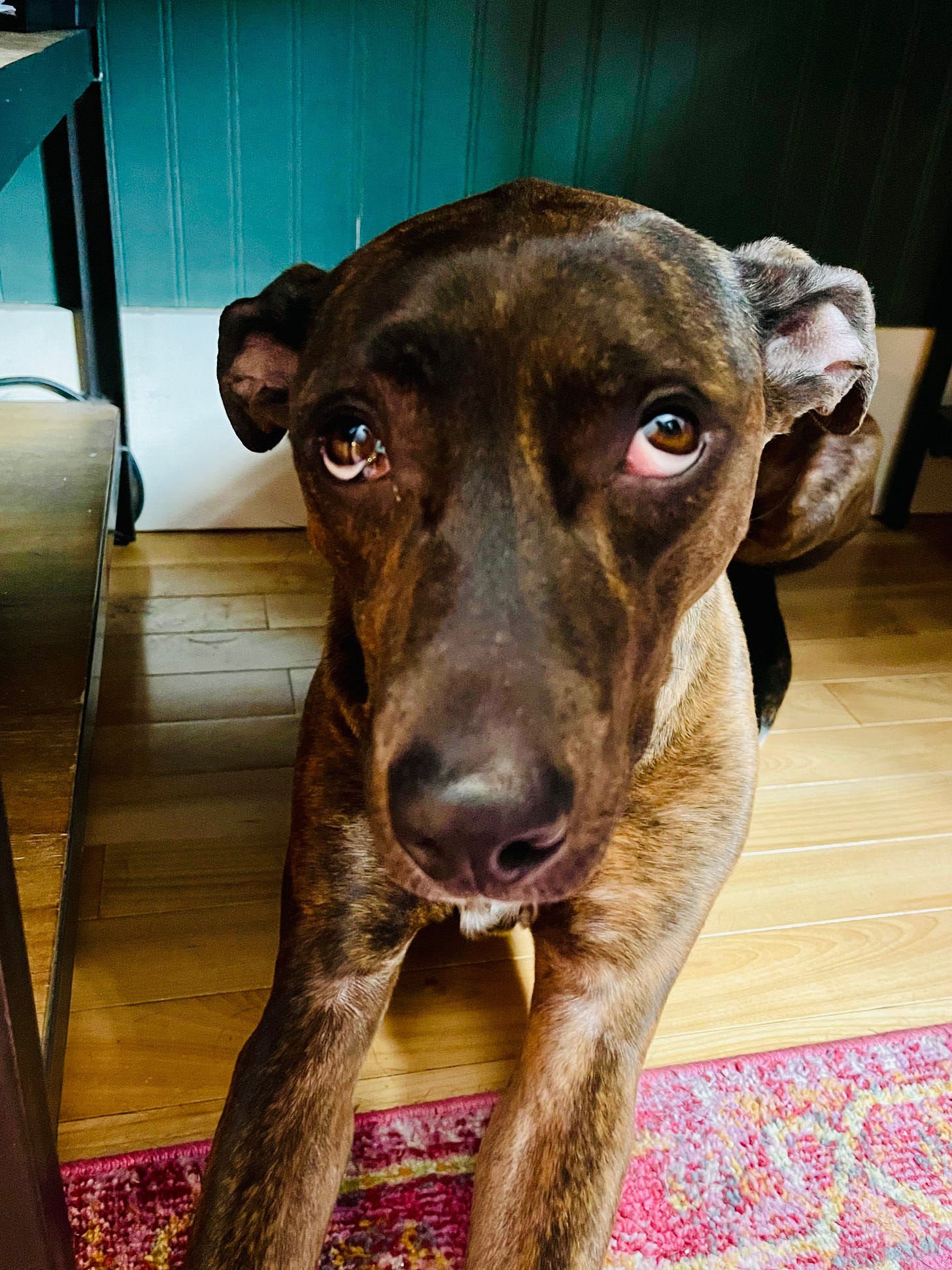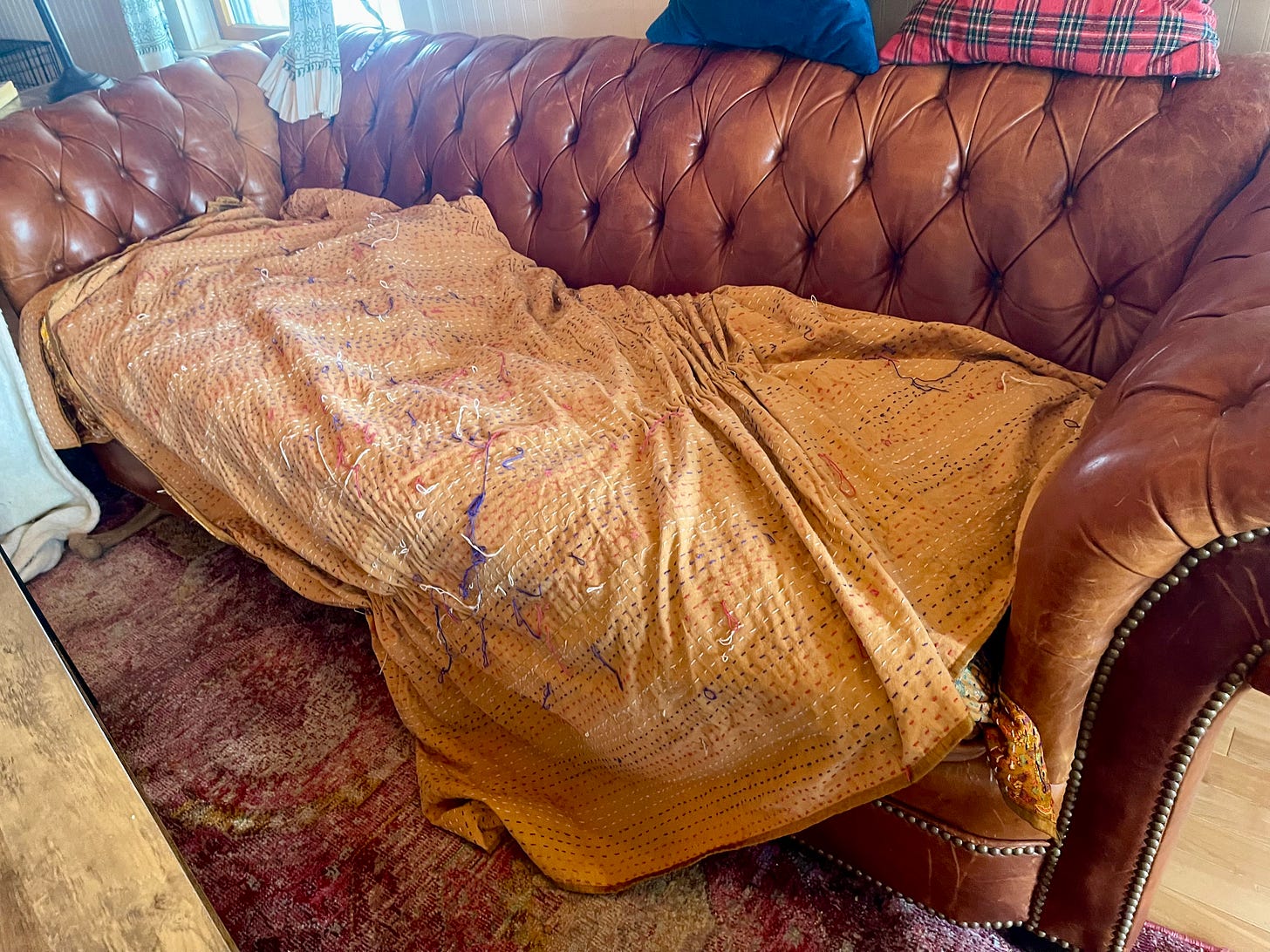Yesterday morning, I had time, which is not something I tend to find a lot of. So, I began project called . . . cleaning. More specifically, the project was called CLEANING THE LIVING ROOM.
I did okay until I didn’t.
That “didn’t” involved me sitting on a floor, cleaning a baseboard and then a lamp on the end table tumbling toward me on my blind side.
I caught it. which was a win. But in that catching, I bashed the lamp against the edge of the end table and the lightbulb shattered. Pieces fell in my hair, on the end table, on the floor, on my lap. Glass was everywhere.
Pogie the Pup ran to hide under my desk. Mr. Murphy Dog watched from afar. The cats did not flinch.
Surrounded by glass and much more mess than was originally there to clean up, I laughed.
I called for Shaun who was upstairs. He did not hear me. This was funny, too, really, if you imagine me on the floor, glass in my hair, bits of it on my pants, shoulders, wooden floor.
All was fine—except for the lightbulb and Pogie’s opinion of me.
Shortly after the light-bulb incident, I had vacuumed the couch and put the blanket we keep on there to protect it from dog claws, and Shaun came in and laughed at me again.
“What?” I said.
Apparently, my standard for the couch covering was not up to his.
He did it over. He kindly suggested that my not-very-detail-oriented self when it comes to housework, take a before-and-after duo of photos.
I did and I started laughing again.
There are times in my life where I would have gotten a bit stuck on these two things. I’d frame them as my failures (breaking the lamp, not being awesome at putting blankets on couches, having an eye that doesn’t work).
Now though? Most of the time? I kind of think it’s funny. I’ve decided to find myself endearing the same way I’d find other people if they’d done these things.
I chose to find the humor and absurdity in these things yesterday. I’m glad I did.
Why?
Well, emotions are pretty contagious. They can spread beyond us and into our family, our friends, our community, our meeting.
So, I am trying (very hard) to acknowledge those big emotions of fear and anger and worry and grief, but also to lean in and choose the big feelings of happiness and joy and gratefulness and excitement whenever they show up, whenever I can.
According to John T. Cacioppo from the Center for Cognitive and Social Neuroscience at the University of Chicago, people’s expressiveness correlates to other people mimicking that expression and noticing it. Then, the muscles that are mimicking the expression activate feelings in the mimicking person’s brain.
Cool, right?
Or maybe terrifying?
Jodi Schultz writes:
“It’s been said it’s easier to catch an emotion than it is to catch a cold, but how is that exactly? Social networks is the answer! According to researchers Nicholas Christakis, professor at Harvard University, and James Folwer, associate professor at the University of California, San Diego, social networks have clusters of happy people and unhappy people within them that reach out to third degrees of separation.
“Christakis and Fowler say a person’s happiness is related to the happiness of their friends, their friends’ friends and their friends’ friends’ friends—that is, to people well beyond their social horizon. Their research found happy people tend to be located in the center of their social networks in large clusters of other happy people where each additional happy friend increases a person’s probability of being happy by about 9 percent.”
Above is the ever-patient Shaun who had no idea I was filming.
SHIFTING YOUR EMOTIONS
There is a cool article on The Greater Good by Jill Suttie all about shifting your difficult emotions. It’s not about NOT having these emotions. It’s about not being STUCK in those emotions, right?
So, it’s about emotional management. And that? That’s a skill.
Suttie looks at Ethan Koss’s new book, Shift: Managing Your Emotions—So They Don't Manage You, and writes:
“Believing emotions are unstoppable can make them difficult to change, says Kross. But you can probably find evidence in your own life that suggests otherwise. For example, if you get a hug when you’re hurting, you feel less pain; if you listen to your favorite music playlist, you feel happier.
“Kross recounts the stories of people who’ve faced very difficult situations triggering intense emotions—like his grandmother, who survived the Holocaust—to illustrate the effectiveness of various emotional management strategies. Some of these have a more internal, individual focus; some involve changing your outer circumstances (which, directly and indirectly, affect your internal state). Here are some things he recommends when you face emotional challenges.”
Very quickly, those skills are paraphrased as these:
Harness your senses
Change your focus.
Change your location
Alter your perspective.
Reach out to the right people for guidance.
Find a culture that suits you.
Practice helps.
It’s really pretty fascinating and I hope I get a chance to dive into each of those skills a bit more and share them with you for the next couple of Mondays.
Why is it important? Well, I think taking care of ourselves is pretty important. Emotions are a big part of that. They can motivate you, but they can demotivate you as well.
As Kross writes:
“How we handle [our emotions] shapes everything from the unfolding of a single day in our own individual lives, to our children’s emotional world, to our workplaces and communities, to political conflicts that unfold around the globe. It’s for these reasons that I genuinely believe that understanding how to manage our emotions is one of the greatest challenges we face.”
LINKS TO LEARN MORE
Greater Good article.
Shift: Managing Your Emotions—So They Don't Manage You (Crown, 2025, 288 pages)
Jodi Schulz article-Emotions are contagious: Learn what science and research has to say about it






